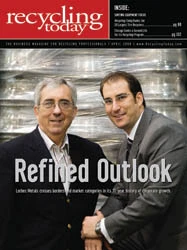While some reclaimers and recyclers say many grades of secondary plastics are still enjoying high demand and good pricing, freight costs and difficulties obtaining containers are having negative effects on their businesses.
"The last quarter has been pretty consistent," a compounder based in the Great Lakes region says. While he says January was a good month, business was down in February compared to last year, though things appear to have bounced back in March.
HDPE (high density polyethylene) continues to enjoy good demand, the Great Lakes compounder says. However, a recycler based in the Midwest says he thinks HDPE markets will begin to show signs of cooling, noting that a large consumer dropped its offer price for the material in February.
Demand for LDPE (low density polyethylene) remains healthy, with pricing in the area of 24.5 cents for export sales and 23 cents to 24 cents for domestic delivery, the Midwestern recycler says. "Trex is buying pretty strongly," he adds.
At the start of the year, Super Sacks of post-commercial PP (polypropylene) were selling for 19 cents per pound on the export market. The price has softened somewhat toward the end of the first quarter to 15 cents per pound, according to the Midwestern recycler. He attributes this decline in pricing to the ban on post-consumer film that China has enacted, noting that inspectors cannot always tell the difference between post-consumer and post-commercial material; therefore, an otherwise acceptable load could be rejected by an inspector who is unable to distinguish between the sources. Because of the costs associated with shipping material overseas, this can be more of a gamble than many recyclers are willing to take.
The problems in the automotive market that began with Dearborn, Mich.-based Plastech’s bankruptcy protection filing in February continue. Blue Water Automotive, based in Marysville, Mich., also filed for Chapter 11 bankruptcy protection in February. The company, which makes injection-molded plastic parts for automakers, is owned by private equity firm KPS Capital Partners Inc., New York City. KPS has been in the process of restructuring the company, according to published reports, since acquiring it in 2005.
Additionally, a strike by American Axle, a supplier to General Motors, is affecting production of pickup trucks and, therefore, demand for plastic trim in these vehicles.
The Great Lakes compounder says he’s already seeing a decline in orders as a result of the strike, which began Feb. 26.
However, he says the bankruptcy filings on the part of Plastech and Blue Water have actually had a positive effect on his business. For instance, prior to its filing, the compounder says it was difficult to get Blue Water’s material back to the company. "Now, they are more focused on costs," he adds.
Sponsored Content
Labor that Works
With 25 years of experience, Leadpoint delivers cost-effective workforce solutions tailored to your needs. We handle the recruiting, hiring, training, and onboarding to deliver stable, productive, and safety-focused teams. Our commitment to safety and quality ensures peace of mind with a reliable workforce that helps you achieve your goals.
Recyclers and reprocessors are certainly aware of what escalating transportation costs and tighter container availability are doing to their businesses.
The higher cost of ocean-going shipments has the Midwest recycler moving away from export markets in favor of domestic shipments. Container availability also is affecting his ability to ship material overseas. He says he now has to book two weeks in advance for containers, whereas two days used to be sufficient in the past. And when the containers arrive, they may not even be what he ordered.
(Additional news about plastics recycling markets is available online at www.RecyclingToday.com.)
Get curated news on YOUR industry.
Enter your email to receive our newsletters.

Explore the April 2008 Issue
Check out more from this issue and find your next story to read.
Latest from Recycling Today
- Athens Services terminates contract with San Marino, California
- Partners develop specialty response vehicles for LIB fires
- Sonoco cites OCC shortage for price hike in Europe
- British Steel mill’s future up in the air
- Tomra applies GAINnext AI technology to upgrade wrought aluminum scrap
- Redwood Materials partners with Isuzu Commercial Truck
- The push for more supply
- ReMA PSI Chapter adds 7 members







